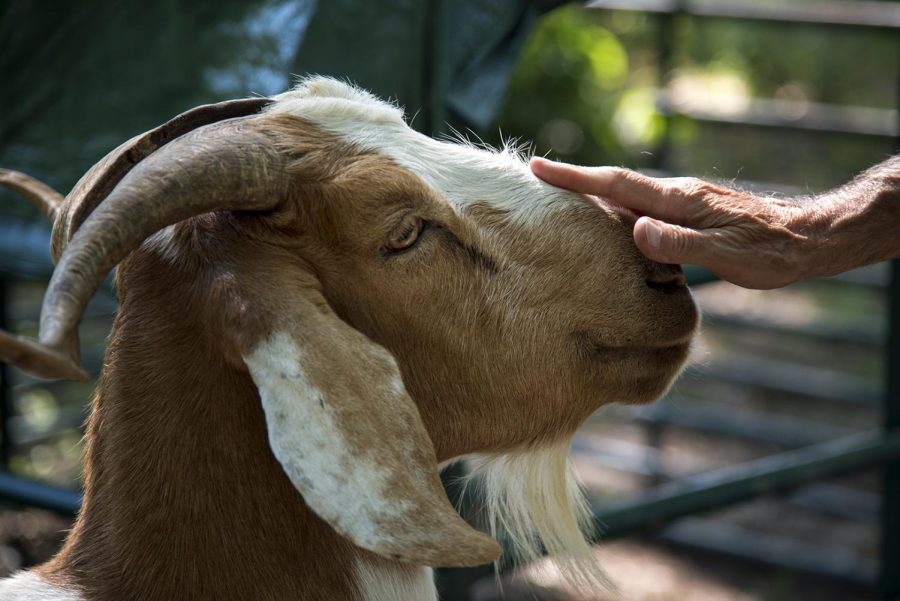Goats provide vegetation management for local cemetery
September 26, 2016
GRAVEYARD GOATS
When the Covington Cemetery became overrun with vegetation, local citizens began to complain about its unkempt nature. Answering this plea, the Bowling Green City Commission sent a small army to help control this vegetation.
This was not an average army, however, but a four-legged army of goats led by Al Dilley, owner and founder of Goat Browsers.
Goat Browsers is a land enhancement service that uses goats as nutrient-recyclers. They will graze the land for approximately 12 hours a day and for 8 weeks, eating almost every plant in their path, Dilley said.
“Invasive species will smother and take over everything,” he said. “You’re never going to be able to get rid of it, you’re just going to be able to manage it.”
This is the third year Goat Browsers has been contracted to the Covington Cemetery. However, Goat Browsers is an idea 25 years in the making and has been implementing its practices since 2009.
Since receiving training from the Tennessee Browsing Academy at Tennessee State University, Dilley has completed approximately 10 to 15 jobs including: vegetation clean-up for private individuals, cemeteries, dams and a private lake.
“It started sort of as a hobby, but I want it to develop into a small business,” Dilley said.
The first year Dilley was contracted to the Covington Cemetery, he brought approximately 16 goats and they finished the project in 12 days. However, since the goats have become a “tourist attraction” for the community, this year there are only two goats and they will stay longer.
“The city wanted the project finished by the end of the growing season, but if I brought them all here in two days it would be done. These guys will be done around Thanksgiving,” Dilley said.
The 200 pound male goats are named Luke and Ramesses. They are usually kept at Dilleys’ farm with 52 other goats split into two herds.
“I named him Ramesses because I enjoy Egyptian history and if you look at his head and his horns, he looks sort of like a pharaoh to me,” Dilley said laughing as he patted Ramesses’ on the head and fed him his favorite treat –– a peanut.
“Give a goat a peanut and you’ll make a friend for life,” Dilley added.
Goat Browsers was hired by the Bowling Green City Commission after it received control of the land in 2014. The land was previously owned by the Covington family who were a “pioneer Warren County family,” according to the sign placed in front of the cemetery.
There are currently 12 members of the Covington family buried inside the private cemetery. Benjamin Covington was the first to be buried there in 1814, and the last documented burial was in 1901.
Brent Belcher, the city of Bowling Green Parks & Recreation director, was in charge of contracting with Goat Browsers this year.
He said the city of Bowling Green has made this an annual project for two reasons: to keep the land aesthetically pleasing and to keep the community members happy.
“Already we’ve had some of the neighbors tell us how excited they are to have the goats back,” Belcher said. “It’s really kind of a unique partnership and thing for the community to have.”
The goats will be watered by a local neighbor; however, they will not need to be fed because they have a “buffet of vegetation” available to them, Dilley said. Generally, the goats will be able to care for themselves; however, a small shelter has been set up in the center of the cemetery.
While using goats for vegetation management has become popular on the west coast, it is a fairly new concept to the South Central Kentucky area, Dilley said.
In fact, this is the first operation of its kind in South Central Kentucky, according to the Goat Browsers website.
Belcher added he would like to use goats at other locations in Bowling Green to help clear overgrown vegetation. However, the goats can only be placed in fenced-in lots, and these are not as abundant, he said.
“If there are other areas that present themselves, we would by all means look into placing goats there,” Belcher said.
Reporter Nicole Ares can be reached at 270-745-2655 and [email protected].
























